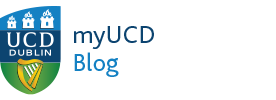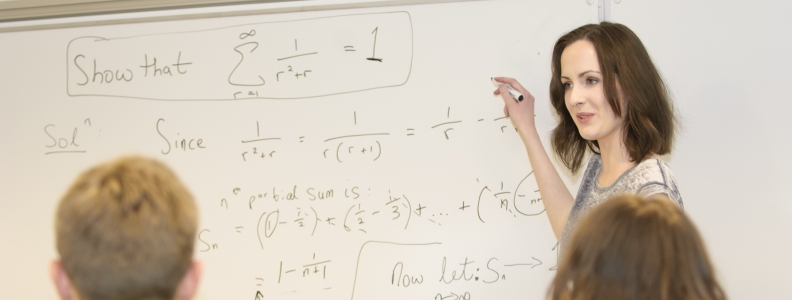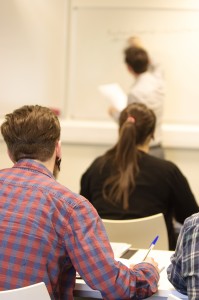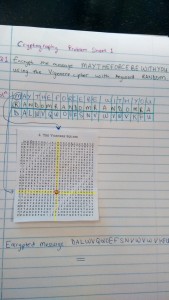Recent graduate Caitríona Byrne has just completed her BSc Mathematics and gives an insight into her experiences during her undergraduate degree…
What can I study?
It is really amazing how many different areas there are in mathematics that you never see or hear about in secondary school! The maths courses that I have done in UCD have covered a wide range of topics. The courses I did in the earlier years of my degree set the groundwork for later years. They built on the mathematical knowledge I had from the leaving cert, and expanded greatly on topics like calculus and linear algebra that I had learnt the basics of in secondary school. As I progressed through the degree, and my knowledge of maths expanded, I was able to study more challenging courses like Galois theory, Group theory, Combinatorics and Differential Geometry to name but a few. These were topics I knew nothing about before I began my mathematics degree. Of course, I also got to study some more well know mathematical topics such as Cryptography, Coding theory and Financial Mathematics.
How do I learn?
Maths modules are usually taught via a mixture of lectures and tutorials. At lectures, the main topics of the course are presented – we get to see the main theorems and ideas in the area as well as the proofs of many of the theorems. Lecturers often also explain how the topic at hand links to other topics that we studied in previous modules, or give examples of how the topic has applications elsewhere. In this way, due to their expertise in the area, the lecturer can guide us through the main ideas of the topic we are studying, so that students can learn much more quickly and with greater understanding than if we were to try to teach ourselves from a book.
At tutorials we are usually given an exercise sheet with questions that were relevant to the content taught in the recent lectures. The tutorial is spent going through the exercises. The best way to learn maths is to try to solve problems, so tutorials (and spending time working on the tutorial sheet before and after) are very important. The questions are often challenging, and I certainly spent many a night trying to solve one question or other – let us just say that maths students need to have a well-sized paper recycling bin in their room! I found university maths a lot more interesting and stimulating than maths in secondary school. There, you work on short questions – and lots of them – in order to be comfortable with different skills. However, at university since the questions can be quite difficult, I found it so much more interesting (and fun) to spend a good bit of time on one question to try to work it out.
What skills will I learn?
In mathematics at third level, I really enjoyed the emphasis on logic and understanding. We saw so many theorems with proofs, and a huge amount of time is spent on proofs. By carefully going through the proofs we were shown during lectures, slowly but surely I improved at being able to construct proofs by myself. When I was in secondary school, theorems and proofs were considered a dull but necessary part of mathematics that just needed to be learnt off (much like a learning your scales on a musical instrument). However, in college you learn how to prove theorems. Learning to prove or disprove mathematical statements forms a large part of any mathematics degree. For instance, for the majority of my exams in final year, I didn’t need to use a calculator at all! A typical exam question would be a mathematical statement which you need to prove (or disprove). This is certainly one of the main mathematical skills that I feel that I have come out of my degree with: knowing how to go about trying to prove (or disprove) mathematical statements. In a more general setting, this training enables maths graduates to be highly analytical and excellent problem solvers – skills that are prized in the workplace.
What if I get stuck?
Every maths student runs into problems that they find difficult or confusing – at least I know that I often did! There is a lot of support for mathematics students in UCD. There is a maths support centre where you can drop in and ask questions. Also, lecturers are really helpful. For instance, when I get really stuck on something, I can ask the lecturer about it at the end of the lecture or send them an email. I have found the lecturers to be really helpful and keen to make sure that I understand their answer. They really want you to understand their courses and they are willing to take the time to explain the answer to your question to you- which is really great!









